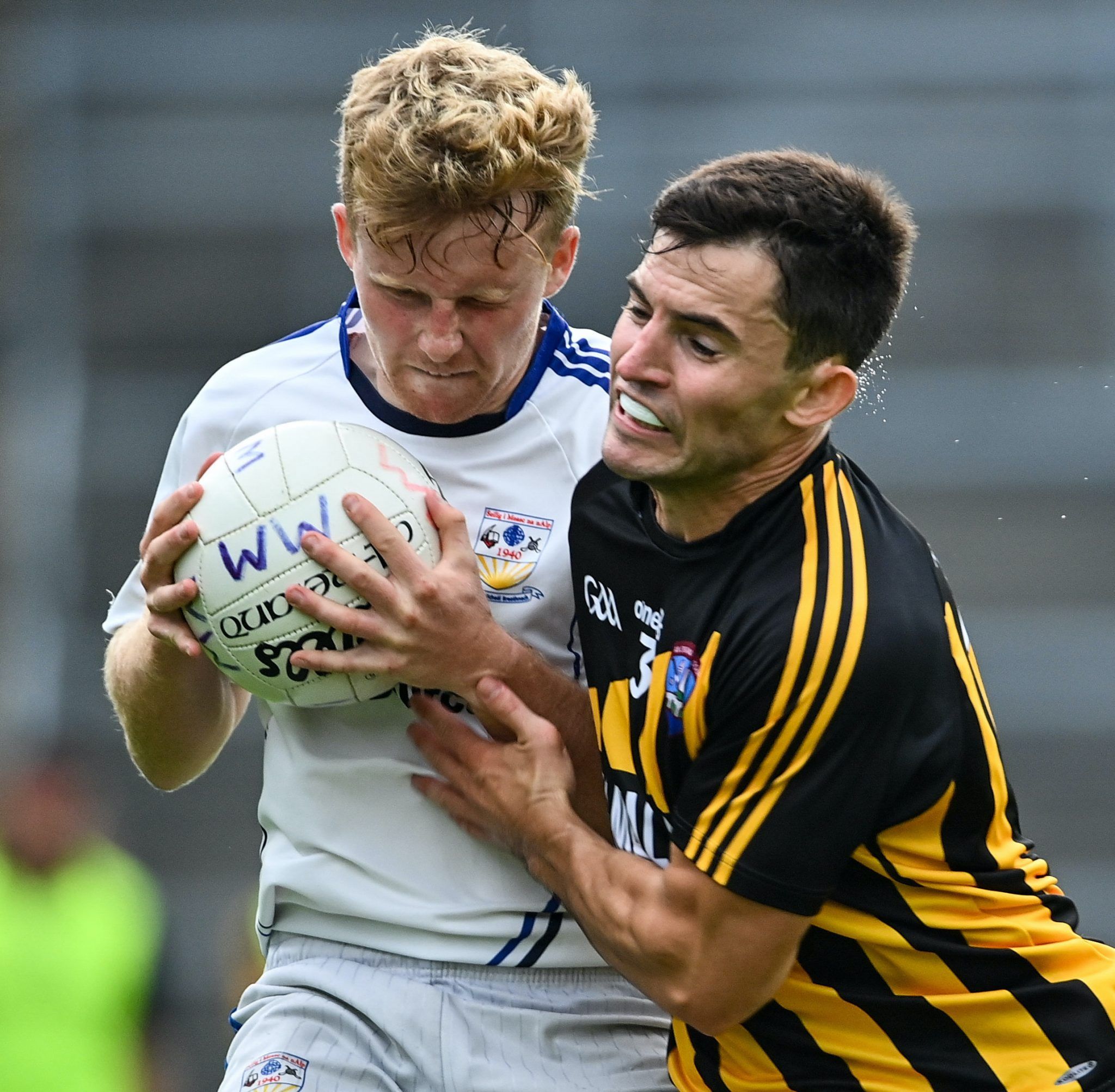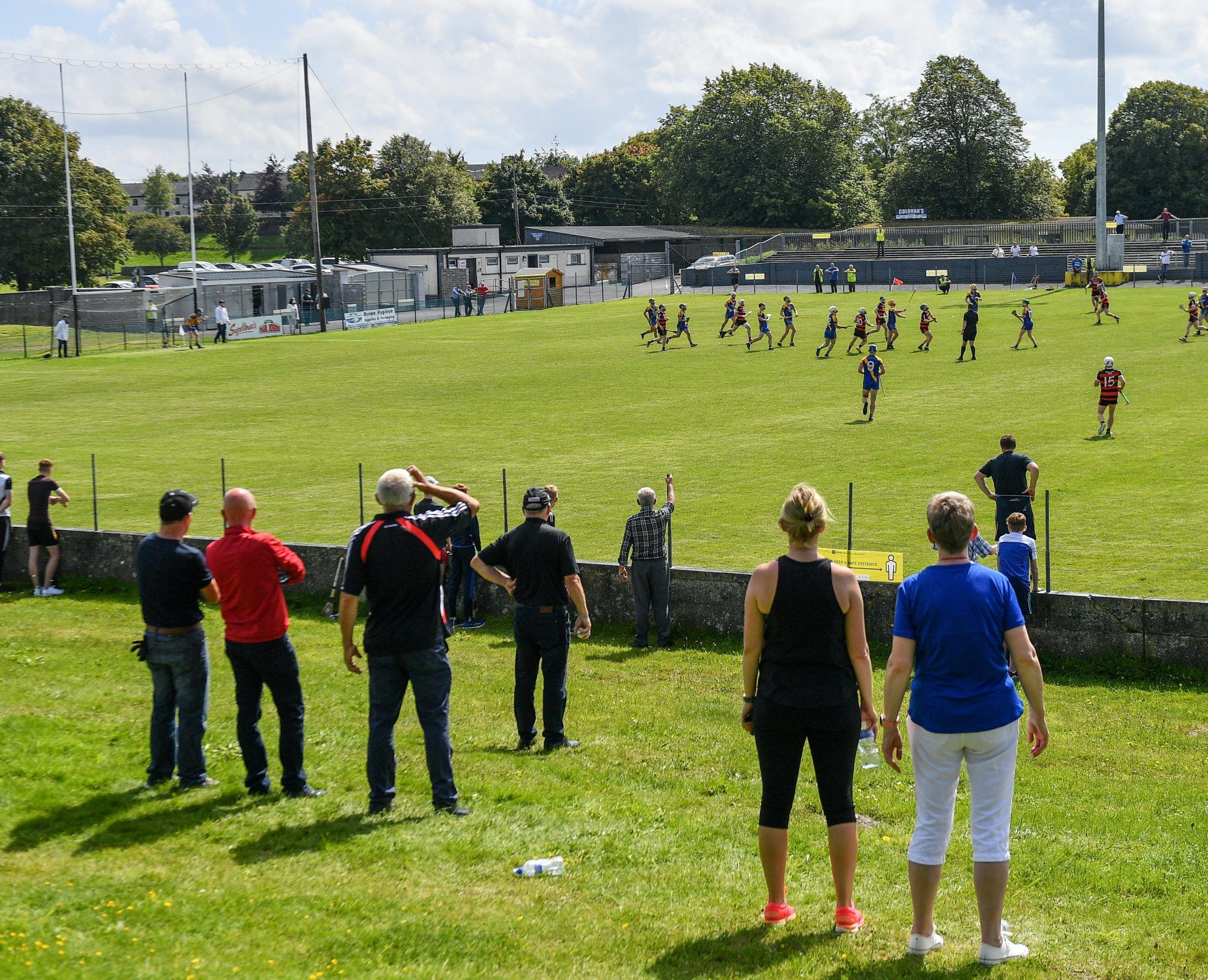

Share
18th August 2020
10:02pm BST

 And this?
This isn't okay. This isn't safe.
And this?
This isn't okay. This isn't safe.
 It's safe to play sport. Safe to tackle, sweat, fight, roar, huddle.
It isn't safe to have 120 or 130 people stand back and watch. It isn't safe to have that many people spread around a 145m x 88m pitch, however big the stand is or however deep the banks are.
It's safe for 50 people - all over 70s if you like - to pile inside a church and sit around for mass. It isn't safe for a 40-year-old to stand alone and watch his son play in his first championship knockout game.
And, I know we said it was safe to play sport there a second ago, but that's only on game day. Playing sport actually isn't really recommended that heavily so new restrictions mean only a maximum of 15 people (outdoors) can train together.
Safe to play sport. Not safe to train.
Dr Ronan Glynn said that the "measures recommended were not aimed at stopping sport" and they were explicit when they said sporting competitions can continue as normal. But either Dr Glynn doesn't realise that there are 15 people per team in Gaelic football and hurling or he really just thinks training is more risky than match day.
The logic, we're told, isn't to make every ruling black and white or to pit every activity against the other. Instead, any opportunity to limit social gatherings is a good one to take where possible, but either it's safe to play or it's not.
Because, at the minute, GAA players are being told that they cannot train in groups of more than 15. But, come match day, they can warm up in their squad of 25, they can play a game with 31 people on the pitch and the subs can stand on the sideline with the coaches and mentors and that's fine as long as Covid-19 knows that this is a game and not a training session.
It's safe to play sport. Safe to tackle, sweat, fight, roar, huddle.
It isn't safe to have 120 or 130 people stand back and watch. It isn't safe to have that many people spread around a 145m x 88m pitch, however big the stand is or however deep the banks are.
It's safe for 50 people - all over 70s if you like - to pile inside a church and sit around for mass. It isn't safe for a 40-year-old to stand alone and watch his son play in his first championship knockout game.
And, I know we said it was safe to play sport there a second ago, but that's only on game day. Playing sport actually isn't really recommended that heavily so new restrictions mean only a maximum of 15 people (outdoors) can train together.
Safe to play sport. Not safe to train.
Dr Ronan Glynn said that the "measures recommended were not aimed at stopping sport" and they were explicit when they said sporting competitions can continue as normal. But either Dr Glynn doesn't realise that there are 15 people per team in Gaelic football and hurling or he really just thinks training is more risky than match day.
The logic, we're told, isn't to make every ruling black and white or to pit every activity against the other. Instead, any opportunity to limit social gatherings is a good one to take where possible, but either it's safe to play or it's not.
Because, at the minute, GAA players are being told that they cannot train in groups of more than 15. But, come match day, they can warm up in their squad of 25, they can play a game with 31 people on the pitch and the subs can stand on the sideline with the coaches and mentors and that's fine as long as Covid-19 knows that this is a game and not a training session.
 Paul Moynagh, professor of immunology in NUI Maynooth spoke on RTÉ and explained the virus is "significantly less transmissible outdoors than it is indoors" but despite the total lack of any evidence that links the GAA to a significant increase in cases - no less, bystanders on the ditch minding their own business or having anything to do with the spread of coronavirus - sport has been punished again and people looking to watch a bit of ball in fresh air are having their lives shut down once more.
One theory was that the players all fill out a Return to Play questionnaire before every session, clearing them to take part as long as they don't have the relevant symptoms - not that they have to have symptoms to be carrying. But since March, we've all engaged in a social contract whereby if you have the symptoms, you self-isolate, you get tested. If you're standing around in a crowd thinking you have Covid-19, you're being a bit of a letdown, aren't you? Even with it being less transmissible outdoors.
And do you know what? Rather than do the government's job for them and invent theories for why someone can't stand outside and watch a game from an overly cautious position, that energy would be better spent asking why the government's testing and tracing system hasn't helped to stop these further restrictions five months after everyone engaged to flatten the curve of cases together.
What's most frustrating, though, is the government's lack of conviction with so many other decisions. Too often, citizens are being 'advised' or 'asked to' or told to practice individual discretion instead of actually just telling people what they absolutely can and can't do. That's where most of the confusion lies and that's where most of the liberties are taken.
In one very specific, rather pointless and harmless instance though, they are making a very clear and concise call. In this one case, they're not allowing anyone to self-police and they're certainly not recommending or advising on what to do. No, they're flat out telling people what to do.
Meat factories? Schools? Nah. More serious, more concerning matters.
They're telling club members and families that they simply cannot and will not compromise. They're telling parents of underage children, children of senior players that, under absolutely no circumstance, can any of them stand in a 20,000-capacity stadium and watch a match.
Why?
The official reason was that it's better to have 50 people at a game than 200.
Evidence of fans impacting the spread of coronavirus? Nope.
I mean, it's better to shut down meat plants, shut down all aspects of life actually, but you don't do that.
Instead of going after the virus hard where we know it is, measures are being softly put in places where the virus isn't, for the most part. What that means is it will still continue to spread and the measures bandied out in less affected areas won't have much of an impact in stopping that.
And what it means is that while people have the opportunity to live their lives again, even in restricted confines, they're now being told to stay away from their club, their passion and, let's face it, their lives.
It isn't safe for you to come down and watch a game anymore. Sorry. Go into the bar there, with you, where it's safe - they're showing it on the big screen.
Paul Moynagh, professor of immunology in NUI Maynooth spoke on RTÉ and explained the virus is "significantly less transmissible outdoors than it is indoors" but despite the total lack of any evidence that links the GAA to a significant increase in cases - no less, bystanders on the ditch minding their own business or having anything to do with the spread of coronavirus - sport has been punished again and people looking to watch a bit of ball in fresh air are having their lives shut down once more.
One theory was that the players all fill out a Return to Play questionnaire before every session, clearing them to take part as long as they don't have the relevant symptoms - not that they have to have symptoms to be carrying. But since March, we've all engaged in a social contract whereby if you have the symptoms, you self-isolate, you get tested. If you're standing around in a crowd thinking you have Covid-19, you're being a bit of a letdown, aren't you? Even with it being less transmissible outdoors.
And do you know what? Rather than do the government's job for them and invent theories for why someone can't stand outside and watch a game from an overly cautious position, that energy would be better spent asking why the government's testing and tracing system hasn't helped to stop these further restrictions five months after everyone engaged to flatten the curve of cases together.
What's most frustrating, though, is the government's lack of conviction with so many other decisions. Too often, citizens are being 'advised' or 'asked to' or told to practice individual discretion instead of actually just telling people what they absolutely can and can't do. That's where most of the confusion lies and that's where most of the liberties are taken.
In one very specific, rather pointless and harmless instance though, they are making a very clear and concise call. In this one case, they're not allowing anyone to self-police and they're certainly not recommending or advising on what to do. No, they're flat out telling people what to do.
Meat factories? Schools? Nah. More serious, more concerning matters.
They're telling club members and families that they simply cannot and will not compromise. They're telling parents of underage children, children of senior players that, under absolutely no circumstance, can any of them stand in a 20,000-capacity stadium and watch a match.
Why?
The official reason was that it's better to have 50 people at a game than 200.
Evidence of fans impacting the spread of coronavirus? Nope.
I mean, it's better to shut down meat plants, shut down all aspects of life actually, but you don't do that.
Instead of going after the virus hard where we know it is, measures are being softly put in places where the virus isn't, for the most part. What that means is it will still continue to spread and the measures bandied out in less affected areas won't have much of an impact in stopping that.
And what it means is that while people have the opportunity to live their lives again, even in restricted confines, they're now being told to stay away from their club, their passion and, let's face it, their lives.
It isn't safe for you to come down and watch a game anymore. Sorry. Go into the bar there, with you, where it's safe - they're showing it on the big screen.
Explore more on these topics: